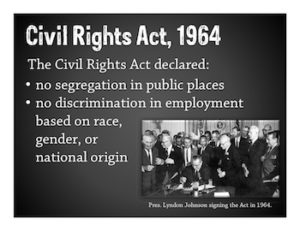
On this date in 1964, Congress passed the Civil Rights Act of 1964. The provisions of the Civil Rights Act prohibited discrimination based on sex and race in hiring, promotion, and termination.
John F. Kennedy argued for a new American Civil Rights Act during the 1960 presidential election. But for the next two years, with over 70 percent of the black vote going to Kennedy, the new president did nothing to promote this legislation. The Civil Rights Act was introduced to Congress a year earlier, in 1963. Kennedy presented arguments in favor of it on June 11 in a speech on television. Kennedy's Civil Rights bill was still being debated by Congress when he was assassinated in November of that year.
His successor, Lyndon Baines Johnson, had a poor record on civil rights issues; to some people’s surprise, he took up the cause. Senator Richard Russell was one of the leading opponents, vowing to fight the legislation to the bitter end. He organized 18 Southern Democratic senators to filibuster the bill. In June, however, Russell privately told two Senate leaders that he would end the filibuster and allow a vote to be taken. The Senate passed it 73-27. The Civil Rights Act was enacted on July 1, 1964
The 1964 Civil Rights Act made racial discrimination in public places, such as theaters, restaurants, and hotels, illegal. It required employers to provide equal employment opportunities. Projects involving federal funds could be terminated if there is evidence of discrimination based on color, race, or national origin. According to some members of Congress, a Southern conservative added sex at the last minute to kill the entire bill since he thought Congress would never pass it with the word "sex."
The Civil Rights Act also attempted to deal with the problem of the denial of the vote to Blacks in the Deep South, stating that uniform standards must prevail to establish the right to vote. Schooling to sixth grade constituted legal proof of literacy. The attorney general was given the power to initiate legal action in any area where he found a pattern of resistance to the law.
A summary of the wording follows: An Act
To enforce the constitutional right to vote;
To confer jurisdiction upon the district courts of the United States to provide injunctive relief against discrimination in public accommodations;
To authorize the Attorney General to institute suits to protect constitutional rights in public facilities and public education
To extend the Commission on Civil Rights to prevent discrimination in federally assisted programs;
To establish a Commission on Equal Employment Opportunity and for other purposes.
Historic U.S. Cases, 1690-1993:
An Encyclopedia New York
Copyright 1992 Garland Publishing, New York
ISBN 0-8240-4430-4
Library of Congress
101 Independence Avenue S.E.
Washington D.C. 20540